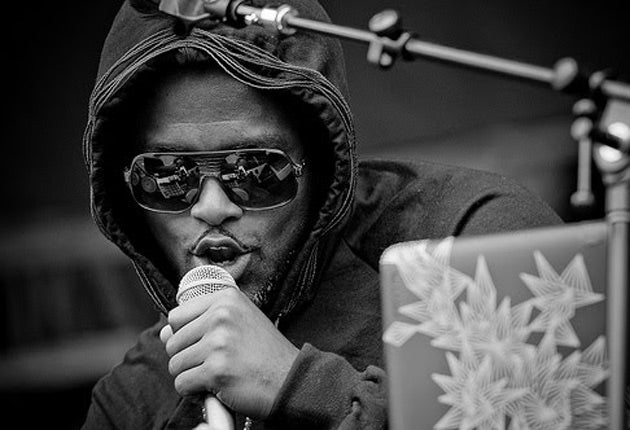Shabazz Palaces - inside avant rap's soul
Miguel Cullen interviews Ishmael Butler of Shabazz Palaces - the face of the avant-rap movement glamorised by Tyler the Creator - about rap selling its soul, winning a Grammy in another life and race-relations in America.

Orpheus, Sartre and Malcolm X – nothing seemed to make sense. But the trail always led back to Ishmael Butler. A sample from one of his albums in ’93, “Samba de Orpheus” by Grant Green; a snippet in an old Washington Post interview where he names Sartre as an influence; a faded photograph in his old flat in Brooklyn, his father posing with a shotgun in front of a poster of Malcolm X. I ask him, therefore if he’s heard of a quote by that guy Sartre, now that we’re talking about Africanism, the hark back to Africa of the disapora: “The untiring descent of the black man into himself reminds me of Orpheus descending into hell to rescue Eurydice.” He hasn’t. “Could you repeat it? Maybe I haven’t understood it properly. Are you saying...that Africa is hell?” There is an awkward silence. I make my excuses and ring off.
Ish Butler, or Palaceer Lazaro, as he is known now, won a Grammy and a Gold certificate in the early 1990s with his previous rap group, the boho, post-Native Tongues Digable Planets. In the last two years he reincarnated himself as part of the close-rhyming, densely-instrumented avant-rap collective, Shabazz Palaces. The first rap signatory to label Sub Pop [[The Shins, Foals, Fleet Foxes], the group has been welcomed by US broadsheets as the serious, most cutting-edge face of this movement, which has been kick-started by the posture and playground language of rappers Tyler the Creator [Odd Future] and Lil B.
He devotes parts of the collective’s first album, Black Up, to attacking the ideals of Hot 97 FM-aired mainstream hip hop – over frothing un-choked cymbals and his signature plumbing bass he hisses at them: ‘I can’t believe we drove this far / and this is who you really are / It cut but it won’t leave a scar...The glimmer of this beach house cliché rap’s getting soft.’ Invective is delivered less hiss-pitch, more in the nasal purr that Digable Planets fans became to accustomed to from their main MC.
Listen and download Shabazz Palaces' track 'Swerve here
Ish is hanging out in his flat in Seattle when we speak watching the first week of Wimbledon. He explains his exasperation at the aspirations of the mainstream as follows: “If you’re making a rap song, which is a culturally African American thing, and you’re speaking about our cultural characteristics and you’re not doing that in a unique way – then that’s usury and I don’t respect that. What I’m talking about with those lyrics [‘All the priceless things that you sold...fiending after white things’] are the aspirations [amongst generic hip hop artists] – ok now you’re rich, and you take your kids to this and this schools, in this neighbourhood – I think you should continue in your own culture. Progress shouldn’t be measured by what another [white] culture is doing – ‘cause then you acquiesce to the fact that they’re better.”
On one of the classic tracks of the album, “Youlogy” Ish raps ‘caked up in fake blood’ over effects like rapid trauma ripples of a Han folk ballad from the East, over a deep interment organ from a charcoal id. This is leavened with grainy jazz brass, while Ish raps: ‘Nothing gonna stop it if it’s bound to turn a profit / ‘for this I let you do it, for this I let you watch it’.’ The song then separates into a stream of one-punch statements, with the dreary organs returning: ‘Things are looking blacker, but black is looking whiter.’
On the subject of black-white cultural paradigms, he continues – talking to me in a loose, retrospectively evasive way: “You see it with language – like a cat will come to a place – and he’ll be a meeting, and some white people will be there, maybe they’ll be executives – and he [the black guy] will say ‘Hey, I’m chillin’, how you doin’, how you livin’?’ And people will say ‘Hey! You don’t wanna talk like that in this setting!’ And why not? Who’s to say that this is not the correct way of doing things? It’s not being anti-white or anti-white culture – it’s just being realistic about what I think life should be about, that’s all.”
Jazz litters Ish’s influences; he tells me he likes Miles Davis, particularly in his Bitches Brew, Live- Evil years, when he was accompanied by Mal Waldron, Cecil Taylor and John Coltrane. As a rapper in the Digable Planets he would ascribe himself a jazz moniker, alongside the rest of the group – he was Clifford Brown on trumpet, another was Sonny Rollins on tenor and another was Eric Dolphy on flute. Jazz is still a big part of his sound with Shabazz Palaces – on the track entitled “Endeavours for never (the last time we spoke you said you were not here. I saw you though” he incorporates five-note brass sequences, with the aforementioned riding cymbals in “Yeah You”. Ish has professed a liking for poet Robert Frost’s colloquialisms; he tells me: “To me poetry doesn’t have any form – or any science to it – people are inventing new ways of transmitting language every day. It’s as legitimate and exactly the same as any poetry – and rappers reach that level a lot.” It was Frost, alongside the other ‘signs’ I read along the way into Ish’s past, that led me to ask him about that Sartre quote. I wish I never had.
Join our commenting forum
Join thought-provoking conversations, follow other Independent readers and see their replies
Comments
Bookmark popover
Removed from bookmarks